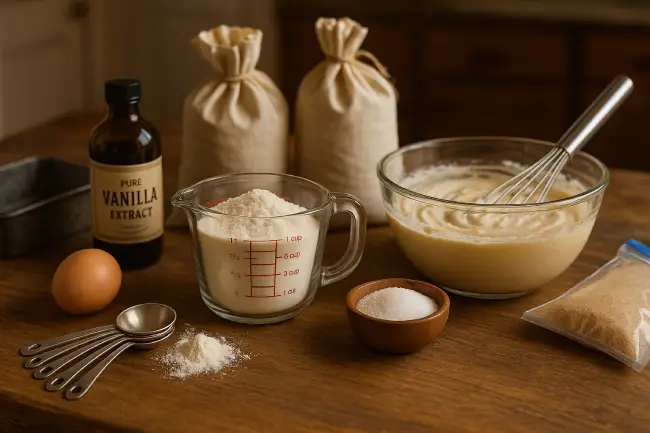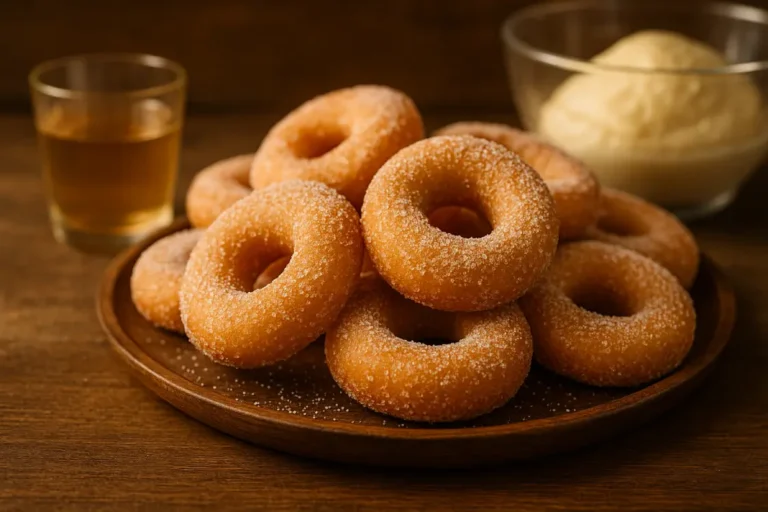How to Start Baking with a Low Budget
Baking can seem like an expensive hobby at first glance. Fancy mixers, silicone molds, a hundred different tools—it can quickly feel overwhelming.
But here’s the truth: you don’t need to spend a fortune to start baking delicious desserts at home. With some clever strategies, you can equip your kitchen and begin your journey in the world of sweets without breaking the bank.
Focus on the Essentials First
When you’re just starting out, it’s tempting to want every tool you see in recipe videos. But most recipes—especially beginner-friendly ones—don’t require much. Focus on these must-have basics:
-
Measuring cups and spoons: Precision is key in baking. You don’t need expensive digital scales to begin with—simple measuring tools will do.
-
Mixing bowls: A couple of sizes are enough. Look for durable plastic or glass ones.
-
Whisk and spatula: These are your mixing heroes. Silicone spatulas are heat-resistant and super versatile.
-
Oven tray and baking pan: A cookie sheet and a basic cake pan are great starters.
-
Hand whisk or manual mixer: If you can’t afford a stand mixer yet, this is enough for most beginner recipes.
Avoid the trap of buying specialty items (like dough scrapers or fondant smoothers) until you’re sure you need them.
Start with Low-Cost Recipes
Some baking recipes call for premium ingredients like almond flour, cream cheese, or expensive chocolate. In the beginning, stick to simple, low-cost recipes that require ingredients already in your pantry.
Here are a few perfect options:
-
Banana bread – Great way to use overripe bananas and doesn’t require fancy ingredients.
-
Sugar cookies – Flour, sugar, eggs, butter. That’s it.
-
Basic chocolate cake – Cocoa powder is cheaper and more accessible than chocolate bars.
-
Muffins – They’re forgiving and endlessly customizable with fruits, spices, or even leftovers.
These recipes help you build skills without burning your budget.
Use Budget-Friendly Ingredients
You don’t need premium vanilla from Madagascar or imported dark chocolate. There are affordable alternatives:
-
Vanilla essence instead of vanilla extract.
-
Vegetable oil instead of butter in some recipes.
-
Powdered milk as a substitute for whole milk in dry mixes.
-
All-purpose flour instead of cake or bread flour.
Buy store-brand items—they’re usually just as good and much cheaper.
Shop Smart and Plan Ahead
Be strategic with your shopping:
-
Buy in bulk: Flour, sugar, and baking soda don’t expire quickly. Buying larger quantities reduces cost per recipe.
-
Look for sales: Keep an eye on grocery promotions. Stock up when your staples are discounted.
-
Use apps or loyalty cards: Many supermarkets offer discounts and coupons through their apps.
Planning recipes ahead also helps you buy only what you need—cutting down on food waste.
Reuse What You Have at Home
Before you shop, take a look around your kitchen. You probably already have a lot of useful tools and containers.
-
Glass jars for storing ingredients.
-
Old baking trays can still be used with parchment paper.
-
Plastic containers work well for organizing utensils and ingredients.
You can also repurpose household items. For example, a clean wine bottle works as a rolling pin in a pinch!
DIY Your Own Baking Tools
Can’t afford piping bags or molds? No problem. Try these DIY tricks:
-
Piping bag: Use a plastic sandwich bag, cut the corner, and attach a piping tip (or just pipe with the cut corner).
-
Cupcake liners: Use squares of parchment paper pressed into muffin tins.
-
Biscuit cutter: Use the rim of a drinking glass or a mason jar lid.
These improvisations might not look fancy, but they work—and save you money.
Learn Through Free Resources
There are plenty of free tutorials online to help you grow your baking skills without paying for expensive classes:
-
YouTube channels: Look for beginner baking playlists.
-
Blogs and forums: Sites like Reddit’s r/Baking offer advice, tips, and troubleshooting.
-
Free PDF guides: Many baking influencers offer free downloads with basic techniques.
Practice what you learn, and don’t be afraid to fail. Each mistake is a lesson.
Make Baking a Habit
You’ll become more confident and creative the more you bake. Here’s how to stay motivated:
-
Bake weekly: Choose one day to try a new recipe.
-
Keep a baking journal: Track what you made, what worked, and what didn’t.
-
Celebrate small wins: A perfectly risen muffin or evenly browned cookie is worth celebrating.
Baking on a budget teaches you not only creativity, but also patience and precision.
Final Thoughts: Baking Isn’t About Fancy Tools
Many of the world’s best bakers started in humble kitchens. Don’t let a small budget hold you back. With a few key tools, smart shopping habits, and a love for sweets, you can start your baking journey today—without spending a fortune.
Let the sweet smell of sugar and dreams fill your kitchen. 🍪







